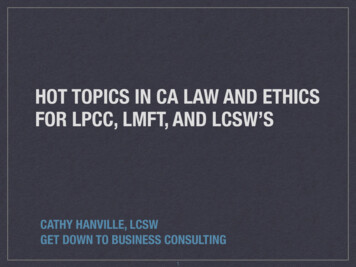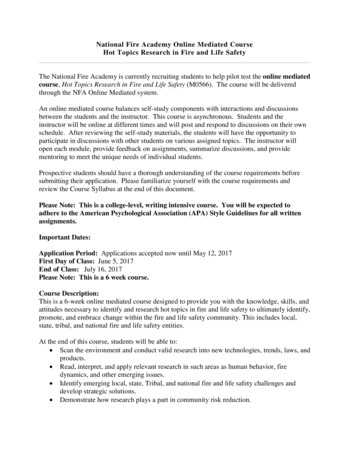
Transcription
HOT TOPICS IN CA LAW AND ETHICSFOR LPCC, LMFT, AND LCSW’SCATHY HANVILLE, LCSWGET DOWN TO BUSINESS CONSULTING1
Learning Objectives1. Participant will be able to name five things to consider whendeciding whether or not to accept a client gift.2. Participant will be able to name the four components that make upthe definition of abandonment.3.Participant will be able to name five factors that need to be takeninto consideration when a subpoena is received.4. Participant will be able to name four different types of dualrelationships that can arise for a therapist.Copyright 2019 Cathy Hanville Get Down To Business Consulting2
Topics CoveredAccepting Gifts Can I Should I?Termination Issues-How to avoid abandonmentAn Overview on SubpoenasMarijuana and your practiceWriting Emotional Support LettersDual RelationshipsCopyright 2019 Cathy Hanville Get Down To Business Consulting3
IntroductionIt was time for me to add a new Law and Ethics Course. Like you I have to take my 6 units everytwo years and I often get a bit bored with the topics. I mean how many times do we have to reviewthe same things. So for this course I decided to touch on a few hotter topics that don’t getdiscussed a lot in courses but may be getting discussed online and other places. In California wenow have legalized marijuana how might that affect your practice? I see emotional support lettersfor clients discussed all the time and there are strong opinions on both sides of that debate.Subpoenas give most of use a headache so I thought reviewing some basics about them (though Iam not a lawyer and always recommend getting legal advice from CAMFT or your malpracticeinsurance).Then I also reviewed the literature to see what topics were getting therapists into trouble. So thebiggest sanction in CA is for not keeping up with your CEUS but since you are taking this course Idid not feel like that had to be reviewed. The second is unprofessional conduct which is such a widerange of offenses. When I found the below article I found that much of this comes from issues withdual relationships so decided that was a worthy topic.(1) The gift giving and the termination topicalso seem like a place where dual relationships play a role and it also seems like many of us worryabout abandoning clients so it is worth covering that. Telehealth was also mentioned to me as a hottopic but I decided to add additional content on that to the Digital Law and Ethics course.I hop this course makes getting your law and ethics CEUS painless and I hope that if you have othertopics that you would like me to cover that you email me atcathy@getdowntobusinessconsulting.com and let me know. I will consider a second version of this ifI get enough additional hot topics.(1) Article 39 Licensure Board Actions Against Professional Counselors: Implications for Counselor Training and Practice C.Emmanuel Ahia and Peter J. Boccone VISTAS online ACA Knowledge CenterCopyright 2019 Cathy Hanville Get Down To Business Consulting4
5
Ethical Standards onAccepting GiftsCopyright 2019 Cathy Hanville Get Down To Business Consulting6
ACA Code of Ethics on AcceptingGifts“A.10.f. Receiving Gifts Counselors understand the challenges ofaccepting gifts from clients and recognize that in some cultures, smallgifts are a token of respect and gratitude. When determining whetherto accept a gift from clients, counselors take into account thetherapeutic relationship, the monetary value of the gift, the client’smotivation for giving the gift, and the counselor’s motivation forwanting to accept or decline the gift.” (1)(1) ACA Code of EthicsCopyright 2019 Cathy Hanville Get Down To Business Consulting7
NASW and CAMFT code of EthicsNASW Code of Ethics does not mention gift giving at all.CAMFT does not specifically mention it but does addressit on their website as a possible dual relationship if thereis “inappropriate gift giving or receiving.” (1)(1) Dual Relationships and Avoiding Liability Sara Jasper, JD, CAE Staff Attorney The Therapist July/August 2018Copyright 2019 Cathy Hanville Get Down To Business Consulting8
What to consider when decidingwhether or not to accept a gift1. Intent of gift-is the client trying to influence yourfeelings about them2. Value of the gift3. How will the client react if you do not accept the gift?4. How might the client feel if you do accept the gift?Might it change their view of you5. How often has the client given you a gift? Do they doit frequently or is it something they do to celebrate aholiday?Copyright 2019 Cathy Hanville Get Down To Business Consulting9
When you should consider acceptinga giftWhen it is a small or token gift. Like ahomemade card or some flowers.When it is at termination or during a holidayWhen you deem that rejecting the gift willcause greater harm than accepting itIf it would cause harm because it wouldviolate cultural normsCopyright 2019 Cathy Hanville Get Down To Business Consulting10
When you always should decline a giftIf accepting the gift would change how you view a clientIf the client is giving a gift because you have not setclear professional boundaries and they feel like you area friendIf you have power to make decisions that will affect theclient ie a custody recommendationIf it is inappropriate (see next slide)Copyright 2019 Cathy Hanville Get Down To Business Consulting11
What can make a gift inappropriate?Intent of giftIf it is sexual or romantic in natureIf it depicts or represents violence or racism orother negative views of another group ofpeopleCopyright 2019 Cathy Hanville Get Down To Business Consulting12
What about giving a client a gift?This is also a fine line. With children it is generallyconsidered acceptable to give them a small gift whenthey terminate therapy.With an adult you would examine your reasons forgiving the gift in the same manner you would if youwere receiving the gift. The timing is also important. Agift at the end of therapy is generally considered moreacceptable.Also many therapists give out things like educationalbooks etc that is also generally considered okay.Copyright 2019 Cathy Hanville Get Down To Business Consulting13
What if you need to turn a gift down?Express gratitude for the thought behind itExplain the reason. It is agency or personal policy to doso. If you are in a private practice and it is your policy todo so it is best to have it written in your informed consentso that clients know this from the beginning of treatmentGive the client space to express their feelings which maytake more than one discussionDon’t over process it though. It may be embarrassing tothe client and therefore hurtful every time it is brought up.Copyright 2019 Cathy Hanville Get Down To Business Consulting14
Other things to considerCultural differences and expectationsGift giving and accepting is shifting the boundaries which can be both agood and bad thing depending on the situationIt can be harmful to clients to reject any gift offered. You need to evaluatebased on each situationIf the gift is from a child or adolescent you may have different boundariesIt is very important to manage your own emotions whether accepting orrejecting the gift. How you react to the situation may affect your work for along time to come. It can potentially damage a relationship to the point itmight have to endAccepting gifts becomes a boundary violation if you are doing so in amanner that exploits the client or takes advantage of them in some mannerAccepting small gifts can increase therapeutic effectiveness and strengthenthe relationshipCopyright 2019 Cathy Hanville Get Down To Business Consulting15
Gifts from people other than clientsWhen to never accept a giftWhen it is for a referralWhen it is from a pharmaceutical companywanting you to promote their productCopyright 2019 Cathy Hanville Get Down To Business Consulting16
References Accepting Gifts Gifts In Psychotherapy & Counseling Ethics, Cultural and Standard ofCare Considerations By Ofer Zur, Ph.D. Gifts in Psychotherapy: Practice Review and Recommendations SarahKnox Marquette University, sarah.knox@marquette.eduMarquetteUniversity e-Publications@Marquette Education Faculty Research andPublications Education, College of 3-1-2008 Ethics Alive - Gifts From Clients: The Good, the Bad, and theEthically Ugly by Allan Barsky The New Social Worker The SocialWorkers Career Magazine Should You Accept Gifts from Your Clients? Theranest Staff Eye on Ethics ’Tis the Season: Managing Client Gifts By Frederic G.Reamer, PhD December 2013 Social Work Today Copyright 2019 Cathy Hanville Get Down To Business Consulting17
18
Ethical Standards onTerminationCopyright 2019 Cathy Hanville Get Down To Business Consulting19
CAMFT Code of Ethics onTermination“1.3.1 TERMINATION: Marriage and family therapists use soundclinical judgment when terminating therapeutic relationships and doso in an appropriate manner. Reasons for termination may include,but are not limited to, the patient is not benefiting from treatment;continuing treatment is not clinically appropriate; the therapist isunable to provide treatment due to the therapist’s incapacity orextended absence, or in order to avoid an ethical conflict or problem.”(1)(1) CAMFT Code of EthicsCopyright 2019 Cathy Hanville Get Down To Business Consulting20
NASW Code of Ethics onTermination“1.17 Termination of Services(a) Social workers should terminate services to clients and professionalrelationships with them when such services and relationships are no longerrequired or no longer serve the clients' needs or interests.(b) Social workers should take reasonable steps to avoid abandoning clientswho are still in need of services. Social workers should withdraw servicesprecipitously only under unusual circumstances, giving careful consideration toall factors in the situation and taking care to minimize possible adverse effects.Social workers should assist in making appropriate arrangements forcontinuation of services when necessary.(c) Social workers in fee-for-service settings may terminate services to clientswho are not paying an overdue balance if the financial contractualarrangements have been made clear to the client, if the client does not posean imminent danger to self or others, and if the clinical and otherconsequences of the current nonpayment have been addressed and discussedwith the client.” (1)(1) NASW Code of EthicsCopyright 2019 Cathy Hanville Get Down To Business Consulting21
NASW Code of Ethics onTermination1.17 continued“d) Social workers should not terminate services to pursue a social,financial, or sexual relationship with a client.(e) Social workers who anticipate the termination or interruption ofservices to clients should notify clients promptly and seek thetransfer, referral, or continuation of services in relation to the clients'needs and preferences.(f) Social workers who are leaving an employment setting shouldinform clients of appropriate options for the continuation of servicesand of the benefits and risks of the options.” (1)(1) NASW Code of EthicsCopyright 2019 Cathy Hanville Get Down To Business Consulting22
ACA Code of Ethics onTermination“A.11.a. Competence Within Termination and ReferralIf counselors lack the competence to be of professional assistance toclients, they avoid entering or continuing counseling relationships.Counselors are knowledgeable about culturally and clinicallyappropriate referral resources and suggest these alternatives. Ifclients decline the suggested referrals, counsel- ors discontinue therelationship.” (1)(1) ACA Code of EthicsCopyright 2019 Cathy Hanville Get Down To Business Consulting23
ACA Code of Ethics onTermination“A.11.b. Values Within Termination and ReferralCounselors refrain from referring prospective and current clients basedsolely on the counselor ’s personally held values, attitudes, beliefs, andbehaviors. Counselors respect the diversity of clients and seek training inareas in which they are at risk of imposing their values onto clients,especially when the counselor ’s values are inconsistent with the client’sgoals or are discriminatory in nature.” (1)(1) ACA Code of EthicsCopyright 2019 Cathy Hanville Get Down To Business Consulting24
ACA Code of Ethics onTermination“A.11.c. Appropriate TerminationCounselors terminate a counseling relationship when it becomesreasonably apparent that the client no longer needs assistance, is notlikely to benefit, or is being harmed by continued counseling.Counselors may terminate counseling when in jeopardy of harm bythe client or by another person with whom the client has arelationship, or when clients do not pay fees as agreed upon.Counselors provide pretermination counseling and recommend otherservice providers when necessary.” (1)(1) ACA Code of EthicsCopyright 2019 Cathy Hanville Get Down To Business Consulting25
Ethical Standards onAbandonmentCopyright 2019 Cathy Hanville Get Down To Business Consulting26
CAMFT Code of Ethics onAbandonment“1.3.2 ABANDONMENT: Marriage and family therapists do notabandon or neglect patients in treatment. If a therapist is unable orunwilling to continue to provide professional services, the therapistwill assist the patient in making clinically appropriate arrangementsfor continuation of treatment.” (1)(1) CAMFT Code of EthicsCopyright 2019 Cathy Hanville Get Down To Business Consulting27
ACA Code of Ethics onAbandonment“A.12. Abandonment and Client NeglectCounselors do not abandon or neglect clients in counseling.Counselors assist in making appropriate arrangements for thecontinuation of treatment, when necessary, during interruptions suchas vacations, illness, and following termination.” (1)(1) ACA Code of EthicsCopyright 2019 Cathy Hanville Get Down To Business Consulting28
Abandonment andStandard of CareCopyright 2019 Cathy Hanville Get Down To Business Consulting29
Issues that can arise with terminationAbandonmentFollowing the standard of care for terminationThe importance of a termination planCopyright 2019 Cathy Hanville Get Down To Business Consulting30
What is abandonment?Abandonment is a legal issue as part of a medical malpractice case.You need the following four parts in order for it to be consideredabandonmentThere is an established relationship between the provider andpatientThe provider stops treating the patient when they still needtreatmentThe ending is abrupt and patient is unable to find a new providerThe patient has adverse effects as a result of the abandonment(1)(1) Patient Abandonment Cases: What You Need To Know by Anjelica Cappellino - May 3, 2018Copyright 2019 Cathy Hanville Get Down To Business Consulting31
What might abandonment look like ethically?In the July/August 2009 issue of The Therapist in the section oftherapist sanctions there is such an example.Patient had begun treatment in March 2005-patient cancelled severalappointments during that time but the therapist also cancelled about25% of the appointments with notice. In July 2005 he did not show upfor client’s regular appointment. The patient left 14 voice mail messagesand the therapist did not respond.The patient began having suicidalthoughts. The Board found that the above actions constituted patientabandonment and were an “extreme” departure from the standard ofcare.(1) Disciplinary Actions-The Therapist-July/August 2009 accessed Nov 21, 2019Copyright 2019 Cathy Hanville Get Down To Business Consulting32
What is the standard of care?Standard of care means that the therapist is handling the situationin a manner that is consistent with what most professionaltherapists would do.Copyright 2019 Cathy Hanville Get Down To Business Consulting33
How To Terminate with aClientCopyright 2019 Cathy Hanville Get Down To Business Consulting34
Termination PlansTherapists should document some type of termination plan. Thatincludes any referrals given, when notice was given to clients, andthe reason for termination. If you have multiple sessions beforeending you should document in each session any discussion abouttermination that occurred.Therapists should do their best to work on an “ideal termination”which is discussed in the next slide.Any deviations from the “ideal termination” should be documentedthoroughly.Copyright 2019 Cathy Hanville Get Down To Business Consulting35
An ideal termination should includeClient reflecting on the effects of their therapy for themClient can see forward using the tools they gained from therapyClient works through feelings on ending the therapy relationshipCopyright 2019 Cathy Hanville Get Down To Business Consulting36
What to do if you end treatment with someone who stillneeds treatmentEmphasis the need for continued treatmentReview the reasons you cannot continue seeing the client withthemMake reasonable efforts to help them find another providerThere must be reasonable time give for the client to findsomeone else (1)(1) Psychiatric Abandonment: Pitfalls and Prevention Lise Van Susteren, MD August 1, 2001Psychiatric Times Volume: 18 Issue: 8Copyright 2019 Cathy Hanville Get Down To Business Consulting37
Special Circumstance with terminationScope of competenceConflict of interestLack of benefit to clientClosing a practiceEnding an internshipFinancial issuesIs is a termination or not?What if the client is in crisis?Copyright 2019 Cathy Hanville Get Down To Business Consulting38
Handling terminating with a client who’sneeds are out of your scope of competenceThis is a situation where many times therapists are so afraid ofabandonment that they don’t refer a client out who is no longerwithin their scope of competence. If you have a client that is out ofyour scope and you are unable to get enough consultation to changethat you are ethically obligated to refer the client out. Not doing socan put you in a situation where you can create liability for yourselffor working outside your scope of competence. You should follow theguidelines for referring out someone whom you can no longer workwith.Copyright 2019 Cathy Hanville Get Down To Business Consulting39
Handling conflict of interestThis is again a situation like scope of competence where youmust refer out. It is ethically called for. You should makereferrals and document the decision. You may also choose toget a consultation on the decision which you would alsodocument.Copyright 2019 Cathy Hanville Get Down To Business Consulting40
Handling lack of benefit to clientThe client no longer benefitting from treatment is a stickiersituation because you and the client may disagree on whetherthey are benefitting or not. The best options are to gainagreement for the referral from the client and if that cannothappen then I would do a consultation with another providerto get a second opinion on the transfer of services. Thisshould be documented in their chart.Copyright 2019 Cathy Hanville Get Down To Business Consulting41
Handling terminating with client whenclosing your practice or ending an internshipFor people closing their practices there is an obligation togive clients ample notice and make referrals for anotherprovider.If an internship is ending agency policy will be followed butagain you may refer to someone else in the agency or youmay be able to take the client with you depending on agencypolicy and where you are going after the internship.Copyright 2019 Cathy Hanville Get Down To Business Consulting42
Handling termination over financial issuesTherapist are under no obligation to work with clients that are unable topay the fees. You should however document any discussions that you havehad with client about amounts due and efforts made to collect them beforeterminating with the client. You should also provide some low cost therapyreferrals.Make sure the client has been made aware, in writing if possible, of thefinancial expectations (1)The client should not be in crisisExplore the clinical issues of term
am not a lawyer and always recommend getting legal advice from CAMFT or your malpractice insurance). Then I also reviewed the literature to see what topics were getting therapists into trouble. So the biggest sanction in CA is for not keeping up with your CEUS but since you are taking











